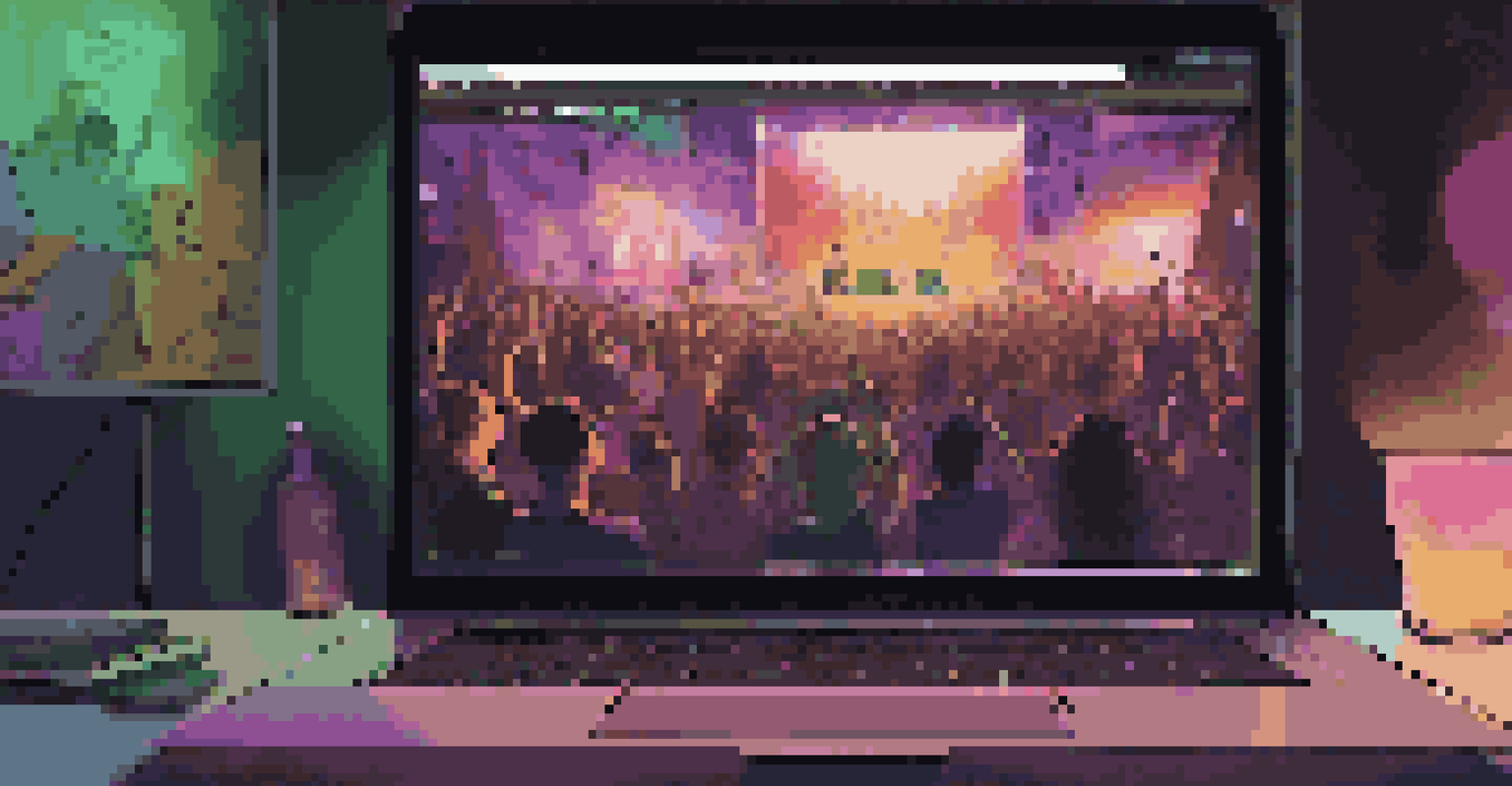The Rise of Virtual Music Festivals: What You Need to Know

Understanding the Shift to Virtual Music Festivals
In recent years, we’ve seen a significant shift from traditional music festivals to virtual events. The COVID-19 pandemic acted as a catalyst, forcing many festivals to go online to adapt to safety restrictions. This change not only helped artists reach their fans but also opened the door for those who may not have been able to attend in person due to geographical or financial barriers.
Music can change the world because it can change people.
Virtual music festivals often feature live-streamed performances, interactive experiences, and even virtual meet-and-greets. Unlike physical festivals, these online events can be accessed from anywhere, making them more inclusive. This model allows fans to enjoy their favorite artists without the hassle of travel or accommodation, which is a big win for many.
As technology continues to evolve, so do the possibilities for virtual festivals. Enhanced graphics, virtual reality (VR) experiences, and social media engagement are just a few examples of how these events are becoming more immersive and engaging. With such advancements, it’s clear that virtual music festivals are not just a temporary solution but a new way to experience live music.
The Benefits of Attending Virtual Music Festivals
One of the most notable benefits of virtual music festivals is their affordability. Many events offer free or low-cost tickets compared to traditional festivals, which can be quite expensive. This price point allows a broader audience to participate, making music more accessible to everyone.

Additionally, virtual festivals often provide a diverse lineup of artists that might not be possible in a physical setting. Fans can discover new genres and artists from different parts of the world, all from the comfort of their homes. This exposure to global music can enrich listeners’ experiences and broaden their musical tastes.
Virtual Festivals Enhance Accessibility
Virtual music festivals make live performances accessible to a wider audience by eliminating geographical and financial barriers.
Lastly, the convenience factor cannot be overlooked. Attendees can enjoy performances from their living rooms, eliminating the need for long drives or hotel stays. Plus, if you need a snack break or a bathroom break, you won’t miss a beat—just hit pause and return when you’re ready!
Challenges Faced by Virtual Music Festivals
Despite the advantages, virtual music festivals also face their own set of challenges. One significant issue is the lack of physical presence, which can diminish the overall atmosphere of the event. The electric energy of a live crowd cheering and dancing is something that virtual platforms struggle to replicate.
The future belongs to those who believe in the beauty of their dreams.
Technical difficulties are another concern. Not all attendees have access to high-speed internet or the latest technology, which can hinder their experience. Additionally, artists may face challenges with sound quality or streaming issues that can affect their performance and, ultimately, audience enjoyment.
Moreover, monetizing these virtual events can be tricky. While some festivals thrive through ticket sales and merchandise, others may struggle to find a sustainable financial model. Balancing affordability for fans while still compensating artists and organizers fairly remains an ongoing challenge.
The Role of Social Media in Virtual Festivals
Social media plays a crucial role in promoting and enhancing virtual music festivals. Platforms like Instagram, TikTok, and Twitter create buzz and allow fans to share their experiences in real-time. This kind of engagement can help build a community around the festival, encouraging more people to participate.
Additionally, artists often use social media to connect with their audiences before and during these events. Live Q&A sessions, behind-the-scenes content, and sneak peeks can create excitement and anticipation, making fans feel involved and valued. This direct connection can enhance the overall festival experience.
Social Media Boosts Engagement
Social media plays a vital role in promoting virtual festivals and fostering community by enabling real-time interaction among fans and artists.
Furthermore, social media allows for innovative marketing strategies. By leveraging user-generated content, festivals can showcase highlights and testimonials, encouraging others to attend future events. This approach not only promotes the festival but also cultivates a sense of belonging among fans.
The Future of Virtual Music Festivals
As we look ahead, the future of virtual music festivals appears bright and full of potential. With advancements in technology, we can expect even more immersive experiences, including augmented reality (AR) and more interactive features. These innovations could transform how we experience live music, making it more engaging than ever.
Hybrid festivals, which combine both live and virtual experiences, are also likely to become more common. This model allows artists to reach wider audiences while still providing the excitement of a live event. Fans who can’t attend in person can enjoy the festival through a virtual platform, ensuring no one misses out.
Ultimately, the rise of virtual music festivals signifies a shift in the entertainment landscape. As audiences become more comfortable with digital experiences, it's likely that these events will continue to flourish, offering new opportunities for artists and fans alike to connect and celebrate music.
How to Prepare for a Virtual Music Festival
Preparing for a virtual music festival can be just as exciting as getting ready for a live event. First, make sure you have a reliable internet connection and the necessary devices, whether it's a computer, tablet, or smart TV. Testing your setup beforehand can help avoid any last-minute technical hiccups during the event.
Creating a festival atmosphere at home can also enhance your experience. Consider decorating your space, setting up comfy seating, and inviting friends to join you virtually. Sharing the experience with others can replicate some of the social aspects of a physical festival, bringing that communal spirit to your living room.
Future Trends in Music Festivals
The future of virtual music festivals looks promising with advancements in technology and the rise of hybrid events that blend live and online experiences.
Lastly, take the time to explore the festival lineup and plan your schedule. Many virtual festivals allow you to watch performances on-demand if you miss them live, but having a plan can help you make the most of the event. Don’t forget to engage with the festival on social media to enhance your experience further!
Final Thoughts on the Virtual Music Festival Trend
The rise of virtual music festivals marks a significant evolution in how we experience and enjoy music. They have created opportunities for inclusivity, accessibility, and innovation that were previously unimaginable. As technology continues to advance, we can only expect these events to become even more engaging and immersive.
While they may not fully replace the energy of in-person festivals, virtual options have carved out a unique space that complements traditional events. For fans, this means more choices and flexibility in how they enjoy their favorite artists and genres.

In the end, whether you’re dancing in your living room or enjoying a live performance under the stars, the love for music remains the same. Virtual music festivals have opened doors to new experiences, and it will be exciting to see how they continue to evolve in the years to come.